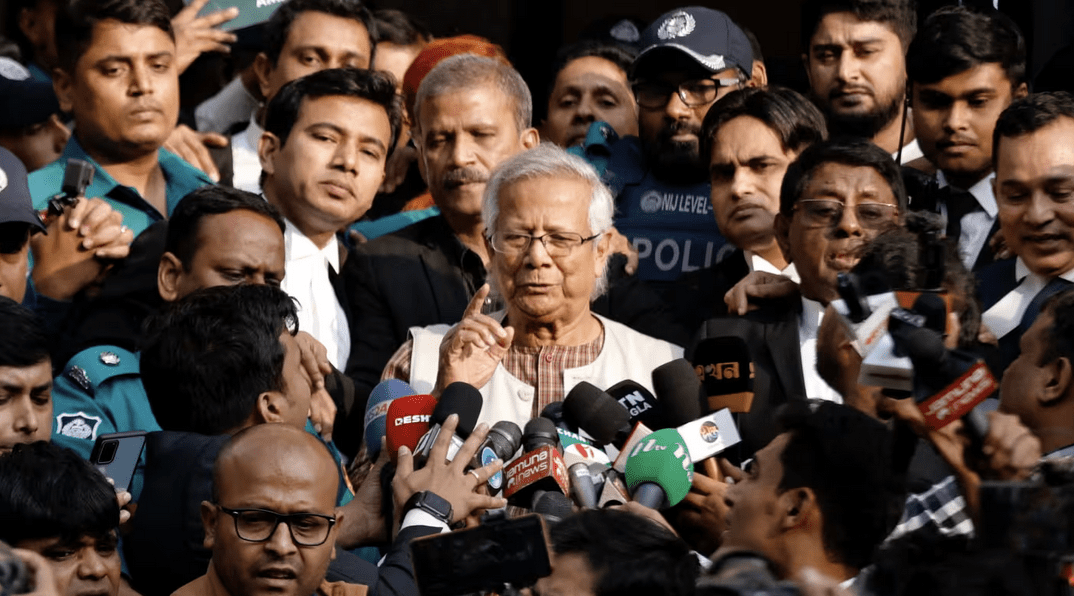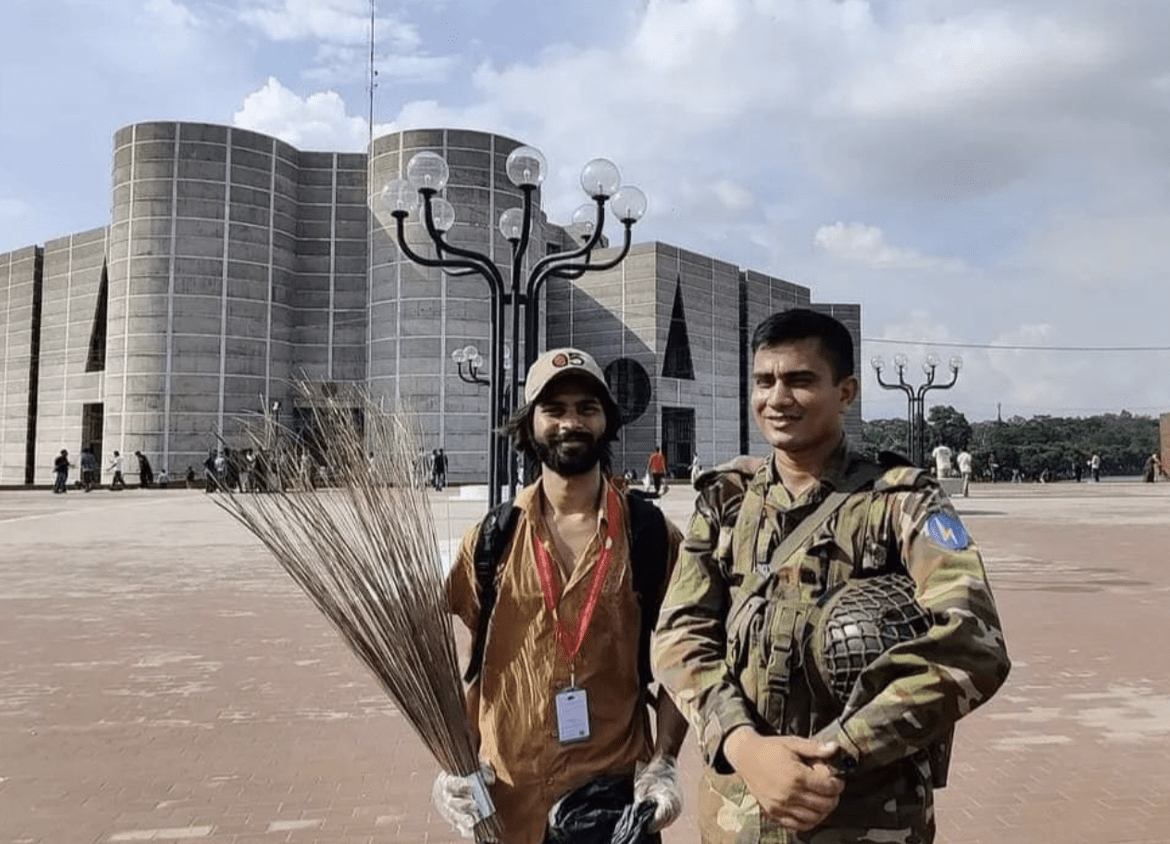Bangladesh Post-Hasina: Yunus as Leader, Democracy Within Reach
 Nobel Peace Laureate Muhammad Yunus, long a political harassment target of Sheikh Hasina, is now interim leader of Bangladesh/Reuters
Nobel Peace Laureate Muhammad Yunus, long a political harassment target of Sheikh Hasina, is now interim leader of Bangladesh/Reuters
By Anil Wasif
August 7, 2024
It is difficult to convey to observers who are neither Bangladeshi nor members of the Bangladesh diaspora just how seismic the events of this week in Dhaka have been in the sweep of the country’s history.
From a month that saw the classic trajectory of student street protests-to-crackdown-to-destabilization, followed by the long-unthinkable resignation and departure of the Sheikh Hasina this week, we are now in a new world of possibilities.
Among the 180-degree-turn developments this week is the accession of Nobel laureate and microfinance pioneer Muhammad Yunus to leader of the country’s interim government just days after global headlines reported a looming life sentence for the long-harassed Grameen Bank founder. For everything the students and citizens have stood for, Bangladesh cannot accept either the army, nor any party previously reported for unjust practices and previously acquitted crimes against humanity, as head of government.
The stunning turn in Yunus’s fate after years of persecution by Hasina, who reportedly perceived him as a political threat, was announced early Wednesday by Joynal Abedin, the press secretary of the country’s figurehead president, Mohammed Shahabuddin.
At the same time, Shahabuddin ordered the release of Hasina’s other relentlessly persecuted political rival, former prime minister Khaleda Zia, from house arrest.
While the Indian government confirmed on Tuesday that Hasina is currently in Delhi, reports indicate that she is seeking asylum from a number of countries, and that influential officials from her cabinet and party, the Awami League, are doing the same. However, her son and former ICT advisor Sajeeb Wazed stated that she has not, rather planning to retire. No official announcement is yet to come on the fate of their party.
Meanwhile, Nahid Islam, a key organizer of the student-led Anti-Discrimination movement, confirmed that the group overseeing the transition has promised to accept a list of names for the interim cabinet, proposed by the protesters and supported by the general public. Unconfirmed versions of the list circulating on social media suggest Bangladeshis reputed for their fairness, non-partisanship and merit; and that it reflects equity.
While the police have gone on strike out of apparent anxiety over possible retaliation for their violent suppression of the recent protests — 300 protesters were killed and hundreds were shot in the eyes — there is a reshuffle in the Bangladesh Army, removing several appointees from top positions. Shifts were also made to appoint key personnel in government, including the foreign ministry. For diplomats, this signals a shift in military influence in government affairs.
On the misinformation front, photos and videos across major national and international news outlets have split public opinion. On one hand was Bangladesh rejoicing from a precedential victory of the voices of the people against an unelected government. On the other was Bangladeshis in fear, confusion and agony as groups of people raided homes, looted armouries and terrorized vulnerable populations. Multiple articles, tweets and mass-distribution messages have instilled fear into Bangladeshis globally, causing unnecessary division, and uncalled for anxiety at a time demanding national unity. In any war, especially one that questions ideology, interest groups have spread false information to divide people.
Democracy is within reach, and only national unity can restore power back to the people of Bangladesh. Therefore, a rational, rights-based and sober reflection of how to navigate this vacuum is requested from civil society. Or else we are at risk of going back to the oppression of the past 15 years under a different face and name.
 Within 24 hours Sheikh Hasina’s resignation, students, civil society and euphoric citizens came together with the army to clean up the mess created by the celebration at the Parliament of Bangladesh in Dakha/Ashraful Alam Chowdhury
Within 24 hours Sheikh Hasina’s resignation, students, civil society and euphoric citizens came together with the army to clean up the mess created by the celebration at the Parliament of Bangladesh in Dakha/Ashraful Alam Chowdhury
Across the country, citizens, especially students, have taken the lead in restoring order and protecting their communities. As protest leaders push for democratic reforms, their supporters and the public have mobilized to safeguard public properties and at-risk communities, showcasing a remarkable display of unity and purpose.
In the wake of the chaos, student volunteers and military personnel launched extensive cleanup operations. These volunteers worked tirelessly to recover looted national treasures, returning them to their rightful places. This collaboration not only restored order but also symbolized the collective effort of millions striving for change. Social media is now awash with images of students organizing and documenting returned goods, highlighting the nation’s commitment to rebuilding.
The student-led movement’s efforts extended beyond cleanup to protecting minority communities, particularly Hindus. Students guarded the Dhakeshwari Hindu Temple and other places of worship, a protective stance that spread nationwide. In regions like Cumilla and Savar, students and Muslim clerics alike voluntarily guarded Hindu temples. The formation of ‘committees for communal harmony and protection of state assets’ further underscored the collective resolve to maintain peace and security.
Support for the students’ cause for a peaceful and just transition of power has poured in from all sectors of society. Teachers, writers, farmers, workers, expatriates, development professionals, and artists all stood in solidarity, expressing shock at the violence and the loss of lives. BRAC University faculty, for instance, emphasized their commitment to a just and democratic society and decried the harassment of students. Leaders of teachers’ organizations and university faculty called for resolving the issues through dialogue and justice for the lives lost during July’s crackdown.
Social media is now awash with images of students organizing and documenting returned goods, highlighting the nation’s commitment to rebuilding.
The Expatriate Unity Council and 30 writers demanded an impartial investigation into the killings, an end to mass arrests, and the immediate release of detained individuals. They also called for lifting the curfew, reopening educational institutions, stopping harassment, and addressing the protesters’ demands.
The Bangladesh Krishak Sangram Samiti and development professionals rallied for the students, condemning the government’s authoritarian response and urging systemic change. Musicians and artists organized events like “Get Up Stand Up” to show their support, drawing large crowds and inspiring solidarity.
This widespread support and active participation from various societal sectors demonstrate a unified national front. The collective effort to achieve justice, democracy, and societal harmony during this tumultuous period in Bangladesh is not only powerful, but inspiring.
Where do we go from here?
Whether it’s Amnesty’s strong statement on prioritizing human rights, or — the only US Congress funded think-tank, the Wilson Center’s — stance on how the “last thing Bangladesh can afford right now is a broader security crisis.”, influential organizations and civil society at-large has reiterated the points I have made above. So, what should we focus on the days ahead?
To ensure that true Bangladeshi democracy is secured in the aftermath of Hasina’s remarkable departure, it is therefore crucial that this phase of the work does not rely on India, or the United States, or Canada or any other country. It wholeheartedly and unequivocally must rely on the merit and voices of the people of Bangladesh.
And while there are countless recommendations for reform that we will get into over the next eleven months, the goal this hour is to ensure an interim government of the people, that is made by the people, for its people. All people.
I hope our hearts and pens don’t rest until we get there.
Anil Wasif is research manager at Infrastructure Ontario and formerly a senior economist at Ontario’s Office of the Budget. He sits on the advisory board of the Max Bell School of Public Policy at McGill University and the Governing Council at the University of Toronto. He actively volunteers his time to help Bangladeshi communities across the globe. Opinions are his own, and do not reflect the views of any organizations with which he is affiliated.
